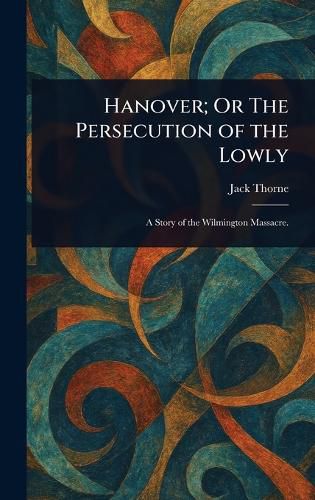Readings Newsletter
Become a Readings Member to make your shopping experience even easier.
Sign in or sign up for free!
You’re not far away from qualifying for FREE standard shipping within Australia
You’ve qualified for FREE standard shipping within Australia
The cart is loading…






This title is printed to order. This book may have been self-published. If so, we cannot guarantee the quality of the content. In the main most books will have gone through the editing process however some may not. We therefore suggest that you be aware of this before ordering this book. If in doubt check either the author or publisher’s details as we are unable to accept any returns unless they are faulty. Please contact us if you have any questions.
"Hanover; Or The Persecution of the Lowly: A Story of the Wilmington Massacre" by David Bryant Fulton offers a compelling narrative rooted in the tumultuous Reconstruction era of North Carolina. This historical fiction recounts a story set against the backdrop of the Wilmington massacre, a pivotal and tragic event in American history. Delving into themes of racial injustice and the African-American experience, "Hanover" presents a fictionalized account that sheds light on the historical realities of the time.
Fulton's work provides a glimpse into the struggles and persecutions faced by those caught in the crosshairs of prejudice and violence. As a historical document meticulously prepared for print republication, "Hanover" serves as both a gripping story and a valuable resource for understanding a critical period in the American South. It is a relevant read for anyone interested in North Carolina history and the broader narrative of racial dynamics in the United States.
This work has been selected by scholars as being culturally important, and is part of the knowledge base of civilization as we know it.
This work is in the public domain in the United States of America, and possibly other nations. Within the United States, you may freely copy and distribute this work, as no entity (individual or corporate) has a copyright on the body of the work.
Scholars believe, and we concur, that this work is important enough to be preserved, reproduced, and made generally available to the public. We appreciate your support of the preservation process, and thank you for being an important part of keeping this knowledge alive and relevant.
$9.00 standard shipping within Australia
FREE standard shipping within Australia for orders over $100.00
Express & International shipping calculated at checkout
This title is printed to order. This book may have been self-published. If so, we cannot guarantee the quality of the content. In the main most books will have gone through the editing process however some may not. We therefore suggest that you be aware of this before ordering this book. If in doubt check either the author or publisher’s details as we are unable to accept any returns unless they are faulty. Please contact us if you have any questions.
"Hanover; Or The Persecution of the Lowly: A Story of the Wilmington Massacre" by David Bryant Fulton offers a compelling narrative rooted in the tumultuous Reconstruction era of North Carolina. This historical fiction recounts a story set against the backdrop of the Wilmington massacre, a pivotal and tragic event in American history. Delving into themes of racial injustice and the African-American experience, "Hanover" presents a fictionalized account that sheds light on the historical realities of the time.
Fulton's work provides a glimpse into the struggles and persecutions faced by those caught in the crosshairs of prejudice and violence. As a historical document meticulously prepared for print republication, "Hanover" serves as both a gripping story and a valuable resource for understanding a critical period in the American South. It is a relevant read for anyone interested in North Carolina history and the broader narrative of racial dynamics in the United States.
This work has been selected by scholars as being culturally important, and is part of the knowledge base of civilization as we know it.
This work is in the public domain in the United States of America, and possibly other nations. Within the United States, you may freely copy and distribute this work, as no entity (individual or corporate) has a copyright on the body of the work.
Scholars believe, and we concur, that this work is important enough to be preserved, reproduced, and made generally available to the public. We appreciate your support of the preservation process, and thank you for being an important part of keeping this knowledge alive and relevant.